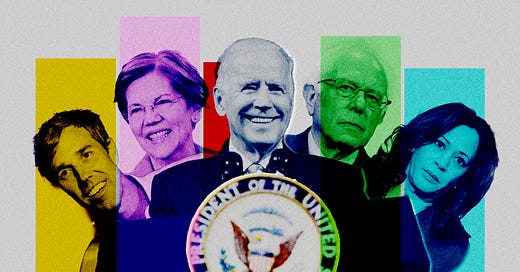
Six Lessons from the Democratic Primaries
The Democratic race is over. Here's what we've learned.
We now know the result: Joe Biden has trounced Bernie Sanders. The race is over—even if Sanders and his movement defy reality. Beyond their outcome, however, the primaries imparted several l lessons about the future of the party and the country.
(1) The Democrats remain a center-left party.
True, Sanders has moved the intra-party debate to the left. But once the primaries winnowed the moderate field, most voters consolidated behind the serviceable survivor - the candidate who positioned himself not as a revolutionary, but as heir to the Obama legacy. The latest Wall Street Journal/NBC News poll, showing Biden leading Sanders by 61 percent to 32 percent, serves as a rough measure of the party's ideological disposition.
With rare deviations—such as the McGovern disaster—mainstream liberalism has defined the party for decades. In former years, blue-collar workers and the labor movement helped center Democratic ideology in resistance to the hard-left. Today, the contending forces have evolved, but the dynamic remains.
As more working class voters trend Republican, the party’s moderating forces have been bolstered by suburbanites and college-educated whites alienated by the GOP. Of course, women and minorities are central to the base. But the issues most urgent to Democratic women have been embraced throughout the party. And minority voters, including African-Americans, have ingrained reasons to be clear-eyed and pragmatic: they know all too well how hard-won social progress can be—especially in such polarized times.
In this age of accelerating anxiety, most Democrats are not seeking ideological adventure. They just want to know where they're going—and to believe that their party can get them there.
(2) Sanders’ intra-party appeal was overrated.
Okay, that seems pretty obvious—he lost. But it's worth considering why.
First, while Sanders scored among Hispanics, he conspicuously failed to attract African-Americans who, historically, have embraced more mainstream Democrats. He needed to sell them on the practicability of his "political revolution" in their own lives—and yet he never really tried.
Second, questions about his ideology merged with fears about his electability.
Take single-payer healthcare, a poison pill in battleground states and, therefore, unsettling to Democrats focused on electability.
But the proposal itself had dubious appeal beyond Bernie's base. Note that Elizabeth Warren's campaign faltered when she embraced single-payer and then, unlike Sanders, tried to explain how to pay for it. In that sense, Sanders took Warren down with him: Once she tried to compete for his minority of true believers, she lost hope of broadening her appeal to moderates. That encapsulates Sanders' own problem—he couldn't turn his plurality into a majority.
Sanders is a more consistent candidate than Biden, and he assembled a far better campaign. Neither helped. In retrospect, Bernie’s broader success against Hillary Clinton in 2016 seems, in great measure, to have arisen from hostility to Clinton. Faced with a rival who arouses much less antipathy, Sanders fell to earth.
The next presidential aspirant who tries to replicate the Sanders coalition may be standing on electoral quicksand.
(3) No Democrat can win the nomination without strong support from minorities.
Again, this seems obvious. Pete Buttigieg and Amy Klobuchar emerged from Iowa and New Hampshire with bounces, but no real chance of winning the nomination—because they had no standing with non-whites.
Buttigieg’s racial difficulties in South Bend dogged him from the beginning; it was clear, moreover, that he lacked the emotional vocabulary for addressing a constituency with such distinctive experiences of race. Klobuchar had no deep connection with minority voters, and was dogged by questions of racial insensitivity stemming from her time as a prosecutor.
Michael Bloomberg, too, was stymied by daunting problems like stop and frisk. As for Elizabeth Warren, she did her damnedest to reach African-Americans, but Joe Biden was already there.
True, Biden had the visceral advantage of his connection to Barack Obama, as well as a long history with African-American leaders. But his principal competitor, Sanders, made inroads from a standing start among Latino voters—largely by using smart grassroots messaging and building an organization. Here, Sanders did the work.
The primary map told the story. Once it left Iowa and New Hampshire, the road to Milwaukee ran through communities of color. Biden dominated among African-Americans, sweeping Southern primaries; Sanders took Nevada and California based on strong support from Hispanics. Everyone else was effectively finished before Super Tuesday.
Let future candidates take notice.
(4) Nonetheless, minority and female candidates are still running uphill.
This is a more complicated subject. Take Kamala Harris, a talented public presence who nonetheless fumbled key issues and failed to establish who she was and why she was running—until her campaign resembled an exercise in serial repositioning.
One could go down the list. The magnetic Cory Booker never defined what he stood for. Julian Castro managed to be both bland and polarizing—no mean feat. Kirsten Gillibrand arrived bearing little but the scent of opportunism and a feminist agenda she failed to broaden. Deval Patrick just arrived too late.
But, still. Was Elizabeth Warren truly more unlikable than Bernie Sanders? And what of the sexist memes that the Bernie Bros hurled at Warren? Couple that with the fear, frequently expressed by women, that America isn't ready for a female president.
That's lamentable—but hardly irrational. By most accounts, Hillary Clinton acquitted herself ably as first lady, senator, and secretary of State. But she arrived in national politics as the wife of a presidential candidate, and then proceeded to pay for every problem voters ever had with Bill.
This hard truth remains: Hillary Clinton lost the Electoral College to a repugnant blowhard with a profound personality disorder who jumpstarted his campaign by racially slurring President Obama. Whatever assessment one makes of 2020 must include the influence of sexism and racism. They are with us still, putrefying the White House.
(5) Sometimes it's okay to be the party of government.
In his first inaugural address, Ronald Reagan famously said: "In this present crisis, government is not the solution for the problem, government is the problem."
Too often, Republicans have distorted this prescription into a mandate to treat government with contempt. Essential services were gutted; civil servants treated like moochers; government repurposed as a universal scapegoat. Disdain for governance itself became a sufficient qualification for Republicans who aspired to serve in government - including the presidency.
And that was okay with many Americans—unless it wasn’t. Neither party is willing to entertain the reform of Social Security or Medicare. Even Obamacare has become sacrosanct: by declaring war on protections for pre-existing conditions, Republicans have handed Democrats a potent issue. And when the electorate sees government as fulfilling functions essential to its well-being, it’s good to be the party that’s competent at governance.
Voters can forget what protects them from terrorism; provides roads, bridges, and transportation systems; supplies clean drinking water - until government stops doing those things well. Then they are reminded, acutely. Now a global pandemic is reminding them that they need the information, protection, and assistance only the federal government can provide.
The age of Trump is an optimal time to promise competent governance.
(6) Trump is THE issue—and this requires Democrats to offer an uplifting alternative.
Let there be no doubt that Donald Trump is the central issue in 2020. A critical mass of Americans deplore his vulgarity, ignorance, self-absorption and contempt for the norms of behavior they expect from a president, and try to honor in their own lives. Now the crisis so many feared has come, compounding his dangerous contempt for science with his lethal inability to think beyond the moment - or himself.
The terrible truth is that Trump's politics and policies are wholly a function of his personal pathology. He is, transcendently, too sick to lead.
Ridding America of this man has become the heart of the 2020 campaign.
But voters have also awakened anew to the import of tempered presidential leadership. For too many cycles, we have treated politics as entertainment. Candidates arose not because of their qualifications, but their novelty—until we reached the point where a significant tenure in public office became a handicap for presidential aspirants.
At last, experience is getting its due. Faced with the alternatives, Democrats rediscovered Joe Biden. That lousy vote he cast 20 years ago, or some incautious remark during the second Bush administration, is now of lesser moment. The traits Biden personifies—competence, empathy, and preparation—are what Americans suddenly desire.
His job is to be that man from now until November: steady, thoughtful, reassuring, and stable. If so, voters will walk into their polling places, see Trump's name on the ballot just above Biden's, and consign this misbegotten presidency to history.












